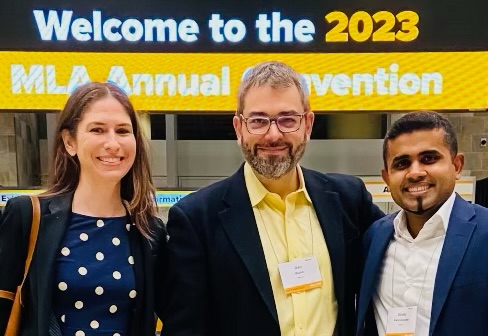Assistant professors of English Erin Pearson, Dinidu Karunanayake, and Dan Burns each presented at this year’s Modern Language Association (MLA) Convention in San Francisco.
Elon University Department of English faculty Erin Pearson, Dinidu Karunanayake and Dan Burns presented research in their respective areas of specialization at this year’s MLA Convention held in San Francisco from Jan. 5-8.

A panelist on the interdisciplinary Forum Session “White Supremacist Terror and Narratives of Origin,” Pearson delivered her paper, “The White Supremacist Strategy of Lost Cause Medievalism,” in a roundtable format that included scholars from Drake, Rice, Caltech, George Washington and Cal State-Monterey Bay. Pearson’s paper argued that Thomas Dixon’s bestselling novels “The Leopard’s Spots” and “The Clansman” (on which the blockbuster 1915 movie The Birth of a Nation was based) used popular ideas about the medieval period to seize the white U.S. imagination and promulgate white racial reunification at the expense of Black lives and rights.

Chairing an Asian Literatures Special Session entitled “The Sri Lankan Geopolitical Novel: Postcolonial Conditions and Neoliberal Bodies,” Karunanayake introduced and moderated discussions by literature faculty from Colgate University, Hunter College and UT-El Paso. His talk, “Shyam Selvadurai’s Mapping of Queer Memory as Postmemory,” applied Marianne Hirsch’s formulation of “postmemory” to the queer Sri Lankan Canadian writer’s work and argued that Selvadurai’s invocation of queer memory fills the gaps of the heteropatriarchal nationalist consciousness, thus presenting a postmemory of postcolonial Sri Lanka.
For the roundtable “Twenty-First-Century Forms,” Burns’ “Too Big to Fail: Hanya Yanagihara’s A Little Life and the Art of Excess in the Age of Inclusion” analyzed narrative theories of maximalist fiction in a comparative case study on the varied reception histories surrounding Yanagihara’s National Book Award-nominated and Booker Prize-shortlisted epic novel. Burns’ paper explored how the existing critical orthodoxy surrounding big, ambitious novels written by women deliberately fails its subjects through implicit biases that conflate the perceived perceptual limitations of a given work’s visionary scope with the minoritarian positionality of its authorship. The panel included scholars from Hartwick College, UT-Austin, Cornell, Oregon, and Penn State-Harrisburg, whose work examined emergent literary forms and their relationship with or remediation by other media, including film, documentary, social media, publishing platforms, transmedia, autotheory, and other hybrid narrative and poetic forms.
The Modern Language Association has been the flagship conference in literary studies since 1883 with sessions that present a range of critical approaches on a variety of languages, literatures, and cultural traditions. This year’s convention’s theme, “Working Conditions,” invited participants to consider the subject of knowledge work through “the reconstruction of the profession, its institutions, and its wider environment.”



